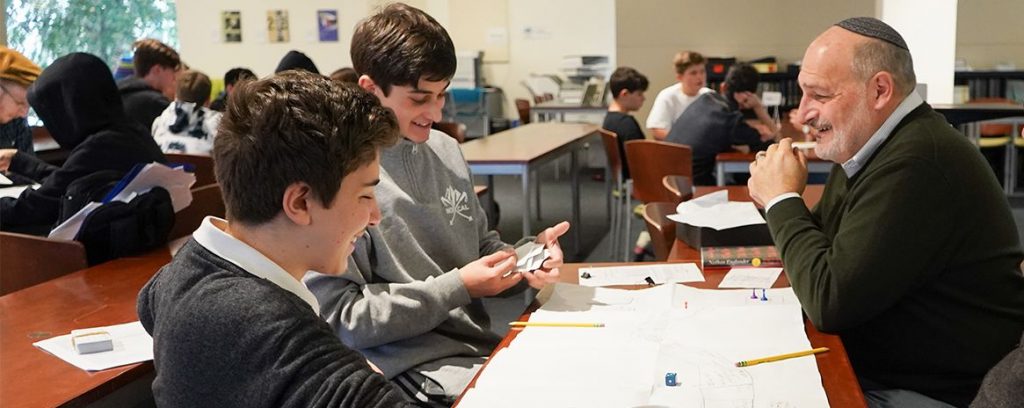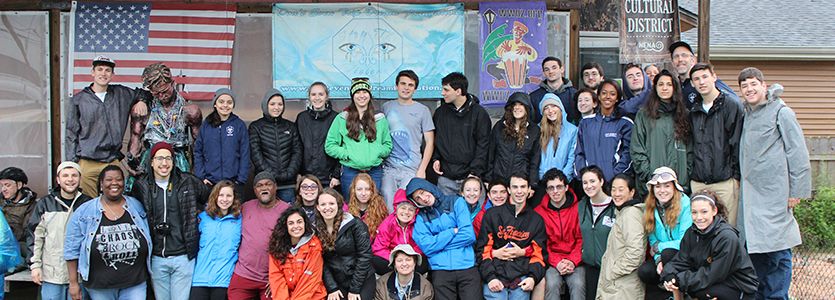Look for the Good and You Will Find It
by Rabbi Howard Jacoby Ruben, Head of School

As this summer opens many might find reasons for despair – from the personal to the global. My grades in June are not what one was seeking last August. My friendships are frayed. Local politics and the presidential campaign seem more divisive than ever. Antisemitism feels unleashed in Europe and at home. Tens of thousands are displaced from their homes by conflict – in Africa, in Ukraine, in Gaza, in Israel. More than 100 hostages from 17 countries are still held in Gaza. Innocent Palestinian children suffer terribly enmeshed with Hamas combatants. The very idea of Israel is under attack. Any one of these shadows is enough to swallow the light of summer. If we let it.
Perhaps an insight taken from an upcoming Torah portion – Shelach (Numbers 13:1-15:41 read in late June) – can help us find more light in the midst of these shadows. That Torah portion is suffused throughout with a single Hebrew verb la’toor — to explore, scout, or seek out. The Torah portion describes hand-picked scouts sent to confirm the divine promises awaiting our ancestors as they come close to crossing into Canaan.
The great scouting mission of Torah, however, fails to confirm the promises. Instead a huge majority of the scouts return from their mission terrorizing the generation of the Exodus about what perils await across the border. Their fear is so crushing they wish themselves dead, erased, zeroed out. Because of this botched scouting report our ancestors are set to wandering in the wilderness as punishment — one year for every day of that failed 40-day mission.
That outcome is so tragic that we tend to conflate the Hebrew verb for scouting here with a different verb used toward the end of Torah by Moses to describe bitter results of this scouting mission. Later in Torah when Moses reflects on the scouts he uses the Hebrew word for “spies” from la’regel (Deut. 1:22-40) instead of “scouts” from la’toor. Which is it, “scouts” or “spies”?!?
Yaakov Tzvi Mecklenburg (19th century Germany) offers a helpful insight into these terms. Mecklenburg taught, the verb latoor is rooted in “searching for the good” while the term “laregel” is rooted in “searching for the bad.” He bases this interpretation on the fact that regel is the Hebrew word for foot, the lowest part of our anatomy, the most base. We literally look down at the shadows. To be a scout, though, means to look up. To find vistas of delight or things that make us smile. For instance, when we are tourists on vacation we have a mindset to look for the good and overlook the bad. But when we are afraid in a strange neighborhood, our anxiety pushes us to look for the bad. When we focus only on our fear we overlook the good.
Similarly, when we are competing in business there can be a tendency to identify a competitor’s weakness – the bad – in order to exploit it. But when we do that we risk ignoring the uniqueness of our product – the good.
Rabbi Nachman of Bratslav taught “you must search for the good in yourself” because then you will find it. Otherwise, you will be swallowed up by only seeing the bad in yourself and others. (See Likutey Moharan I, 282) Dwelling on the “bad” inside oneself, he writes, leads to “deep sorrow and heaviness that overcome” one’s spirit. While looking for the good inside oneself “can give [one] new life. Even if you know you have done wrong and caused damage … you must search until you find the good that is still inside you. This will give you new life and make you truly happy.” (id.)
Our challenge in the summer ahead is to identify the bad we seek to overturn while keeping our eyes lifted to see the good we want to replace it. If we permit ourselves to be swallowed in the shadows, then like the spies in this week’s Torah, we will be paralyzed by fear. If we can keep our eyes on the huge, even seemingly unattainable, good that we are pursuing we can find the light of inspiration to persevere and preserve hope along the path of our lives.









